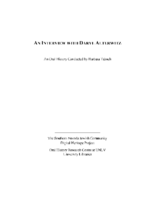Search the Special Collections and Archives Portal
Search Results

Transcript of interview with Daryl Alterwitz by Barbara Tabach, November 8, 2014
Date
Archival Collection
Description
Interview transcript with Daryl Alterwitz by Barbara Tabach on November 8, 2014. In this interview Daryl Alterwitz, son of Deanne and Oscar Alterwitz, recalls moving to Las Vegas from Gary, Indiana, for his parents' pursuits in the furniture business. He speaks about his schooling at Valley High School, his friendship with Robert Engel, and attending University of California Santa Cruz, and taking a leave of absence to travel through Asia. Alterwitz became more involved in Judaism after his bar mitzvah, and has continued his religious affiliation throughout his adult life, and has traveled to Israel twice. He talks about meeting his former wife, his travels through Europe, and coming back to Las Vegas after some time in Reno.
In 1959, Daryl Alterwitz was born in Gary, Indiana, son of Oscar and Deanne Alterwitz. When he was thirteen years old, his family moved to Las Vegas to capitalize on new opportunities in the growing city, and his parents purchased Walker Furniture soon after their arrival. As a high school student, Daryl experienced a powerful trip to Israel, which strengthened his connection to Judaism. After graduation from Valley High School, Daryl attended the University of California - Santa Cruz, and after two years of study, Daryl took time off to travel throughout South Asia, accompanied by close childhood friend Robert Engel. He returned after a year and graduated with an independent major in classical studies. From there, Daryl spent more time in Israel living on a kibbutz. Daryl next went to law school at Santa Clara University, and then supplemented his education with a degree in taxation from New York University School of Law. Between law school and New York, he met his wife, Teri Shoofey; they two had two children, though are now divorced. After New York, he returned to Nevada, first living in Reno. After his father passed away, Daryl moved back to Las Vegas, and took on more responsibility with the family business as well as practicing law. Daryl?s commitment to community service is enduring and visible. He has donated his time and resources to both Jewish organizations, like Jewish Family Services, and non-Jewish groups, like Las Vegas Rescue Mission. He has also served on the boards of the Jewish Federation, Congregation Ner Tamid, and the Anti-Defamation League. Daryl also continues to indulge his passion for international travel, having visited Morocco, Egypt, Turkey, Cambodia, and has even biked from Hungary to Poland.
Text

Transcript of interview with Harry Sax by Barbara Tabach, April 8, 2015
Date
Archival Collection
Description
Interview with Harry Sax by Barbara Tabach on April 8, 2015. In this interview, Sax discusses his family history and upbringing in Chicago, and his military service in Munich. He returned to Chicago and became business partners with Michael Schulson, with whom he opened several Arby's outposts, and expanded to Las Vegas in 1968. He talks about life in Las Vegas in the 1970s and the competition in the fast food industry. He then talks about the reform congregation in Chicago and his connection to Judaism throughout his life. He describes himself as a "closet Jew" before becoming president at Congregation Ner Tamid in 2007. Sax discusses the programs at Ner Tamid for all ages, and his continued involvement in the community.
In 1939, Harry Sax was born in Chicago, Illinois, the son to first generation American Jews. He spent his childhood on Chicago's South, where his family belonged to a progressive Reform congregation. After graduating from Hyde Park High School, he continued his education at Indiana University. In college, Harry was a member of the ZBT Jewish fraternity, participated in a singing group, and was a cadet in the Reserve Officers' Training Corps. Upon graduating from college, Harry was stationed in Munich, Germany as a second lieutenant in the Quartermasters Corps. In addition to his required military duties, he also participated in an after-hours acting group; through this group, he was hired as an extra and for small roles, including The Great Escape. When he finished his service, Harry returned to Chicago, where he connected with a high school friend, Mike Schulson. The two became partners and purchased Arby's franchises in Chicago and Las Vegas. Thus, in 1968, while his partner remained in Chicago, Harry moved to Las Vegas and opened two franchise locations in two weeks. Though it took a few years to stabilize the business and overcome competition, he opened a third location in 1972 on South Decatur, what was then the western edge of the city. Today, Harry has nineteen locations in Las Vegas, with additional franchises in Reno and Barstow, California, and employs nearly 300 people. After about twenty years as a "closet Jew" in the city, Harry reconnected with Judaism and joined Congregation Ner Tamid in the late 1990s. He served on its board, eventually becoming vice president and then president (2007-09). He also dedicated himself to have a bar mitzvah, following up on his Jewish education and confirmation as a teenager. Harry has also served on the Anti-Defamation League's board as well as an active member of the Chamber of Commerce.
Text

Transcript of interview with Henry Kronberg by Barbara Tabach, February 26, 2015 and April 13, 2015
Date
Archival Collection
Description
Interview with Henry Kronberg by Barbara Tabach in two sessions, February 26 and April 13, 2015. In the first session Kronberg talks about his childhood in Germany and Poland and his experience being imprisoned by the Gestapo, and transported to a concentration camp. He survived the Holocaust and met his wife, and they moved to the United States in 1946. He discusses being reunited with his sister in Las Vegas after decades of searching, and moved his family to Las Vegas in 1962. Kronberg talks about becoming involved with Jewish life here, and his wife, Lillian's involvement at Temple Beth Sholom. In the second session, Kronberg discusses purchasing Stoney's, a loan and pawn shop, including some of the clientele and merchandise. He also discusses other social and environmental concerns like anti-Semitism and water resources in Southern Nevada.
Henry Kronberg was born in 1920 and spent his early childhood in a town on the border of Poland and Germany, about 40 miles from Krakow. For years he felt uncomfortable telling his story of surviving the Nazi concentration camps of World War II. Today his name is linked to the Sperling Kronberg Mack Holocaust Resource Center in Las Vegas. And in his soft-spoken manner, Henry recalls his ordeal of loss of family and survival during this most heinous of situations through backbreaking labor and ingenuity. At the end of the war, Henry met the love of his life, Lillian, also a survivor. The two married in 1946 in Frankfurt and immigrated to New Jersey where she had relatives. He describes their difficulties and the various jobs he held until becoming an excellent baker. Then in 1962 an interesting choice took him to a bar mitzvah in Canada. While there the dinner conversation lead him to a great discovery?his sister Lala had survived and was living in Las Vegas. Soon he moved his wife and daughter to Las Vegas. His first foray into business was with his brother-in-law. However, soon it was important to be independent and to control his own destiny. He purchased a going concern, Stoney's Pawn Shop, from Dr. Alexander Coblentz, one of the city's first doctors. He became the fourth owner of Stoney's and operated it until selling it to Steven Mack in 1998. Henry and his wife were active in the Jewish community. They joined Temple Beth Sholom and became fast friends with many of the early leaders of Las Vegas and became a respected member of the secular and Jewish communities.
Text

Transcript of interview with Greg Goussak by Barbara Tabach, May 19, 2015
Date
Archival Collection
Description
Interview with Greg Goussak by Barbara Tabach on May 19, 2015. In this interview Goussak discusses his upbringing in Las Vegas, including his education in the Clark County School District and his experience with bussing to Sixth Grade Centers as the school district attempted to desegregate. As a teenager, he became involved with the B'nai B'rith Youth Organization through Temple Beth Sholom. Goussak talks about his mother's involvement with the Albert Einstein Hebrew Day School, which later moved and became the Dr. Miriam and Sheldon Adelson Educational Campus, and the kidnapping of Cary Sayegh. He then discusses finding his niche in accounting through taking an accounting course at UNLV as a high school student. Goussak talks about his education, career path as a controller in the gaming industry and public works projects, and becoming a professor.
Greg Goussak is a Las Vegas native, born January 1961, just after his parents moved to the city for his father's work as an accountant. His mother was a dedicated educator, who served throughout the city as a teacher and principal, including as the director of the Hebrew Day School in the 1970s. Greg's childhood was shaped by experiences with Las Vegas' sixth grade centers, challenges with scoliosis, and especially, involvement with B'nai B'rith Youth Organization (BBYO). In 1974, Greg helped start the city's new Aleph Zadik Aleph (AZA) chapter for BBYO, and his involvement with this youth organization became a formative part of his junior high and high school years. During this time, he became very involved with AZA at the regional, district and national levels, and made lifelong friends. As a high school student, Greg participated in UNLV's Early Studies Program, earning him college credit, and there he discovered his aptitude for accounting. He began tutoring fellow high school students in accounting, and thus, simultaneously discovered his passion for teaching. After earning his bachelor's degree in hospitality administration from UNLV in 1984, Greg got a job at Dunes Hotel and Casino, then under the leadership of Moe Shenker, working as an operations analyst. Over the next decade, Greg worked as a controller at several properties around town, including Nevada Palace, the Four Queens, Fitzgeralds, as well as a project on Boulder Highway. In 1992, seeking a reprieve from the gaming industry, Greg went back to UNLV to achieve his master's degree, in hotel administration. After graduating, he worked for Riviera Hotel and Casino, and established and oversaw their auditing department as well as box office. During this time, Greg met his wife Cynthia (Cindy) Riceberg, and the two were married in 1996. That same year, Greg took a position with Sigma Game, and soon after became Chief Financial Officer for Manpower Temporary Staffing. In 2002, deciding it was time to work for himself, he bought Haynes and Thomas Printers, which he owned and operated for the next eight years. Greg started teaching in 1989 as an adjunct professor in the William F. Harrah College of Hotel Administration at UNLV. In 2010, having finished his doctorate the year before, Greg assumed his first fulltime faculty position as an assistant professor at the University of Southern Nevada. The next year he was hired as an assistant professor at Ashford University, where he continues to teach today in the Forbes School of Business. Greg and Cindy have two daughters: Ariel, who is seventeen years old, and Alyssa, who is fourteen years old.
Text

Transcript of interview with Phyllis Friedman by Barbara Tabach, March 2, 2015
Date
Archival Collection
Description
In this interview, Phyllis Friedman reflects upon her extensive work with the ADL in Las Vegas. She discusses the city?s relatively low anti-Semitic activity, and how this allowed the Las Vegas ADL office to focus its efforts more broadly than in other cities. She also touches upon her family history, and how the community of Las Vegas has evolved since first visiting in 1963.
A Chicago native, Phyllis Friedman first came to Las Vegas in 1996 to become the Jewish Federation of Las Vegas? first foundation director. After two years, Friedman moved to year Los Angeles to work for ORT. Itching to get back to Las Vegas, in 2007, Friedman returned to the city to became director of the Nevada regional office of the Anti-Defamation League (ADL). In this position, she worked with schools as well as law enforcement, including the Federal Bureau of Investigation (FBI), teaching about tolerance and justice. She is a recipient of the FBI?s Las Vegas Division Director?s Community Leadership Award as well as the first awardee of Jewish Federation?s Jewish Professional of the Year. Three weeks into retirement, Friedman gave this interview, reflecting upon her extensive work with the ADL in Las Vegas. She discusses the city?s relatively low anti-Semitic activity, and how this allowed the Las Vegas ADL office to focus its efforts more broadly than in other cities. She also touches upon her family history, and how the community of Las Vegas has evolved since first visiting in 1963.
Text

Transcript of interview with Steven Eisen by Barbara Tabach, September 14, 2016
Date
Archival Collection
Description
Steven Eisen (1966 - ) is the oldest son of Barry and Beverly Eisen, who were part of the migration of Jews from St. Louis to Las Vegas in the 1960s. He is married to Stacy Fisher and the older brother to Andrew and Robert Eisen. They are members of an early group of born-and-raised Las Vegans. Growing up Jewish, he became a bar mitzvah, belonged to B?nai B?rith Youth Organization. In this oral history interview, Steve recalls enjoyable stories of growing up in Las Vegas and humorous anecdotes of mistaken identity since the three brothers bear such strong physical resemblances. Today he finds himself enjoying his career as CEO of the Children?s Heart Center since 2001 and talks about the success and reputation of the pediatric medical group. It was his first job as a fourteen year old helping Theodore Manos and Michael Cherry during the MGM fire litigations where he learned about the legal world and being organized as a path to success in whatever he might pursue. Steve graduated from University of Missouri, attended law school at Washington University in St. Louis, and received his business degree from UNLV. Throughout the interview, he recalls the steady and strong involvement of his parents in their sons? educations. He also describes their active connection with the Jewish community and organizations. Steve?s wife Stacy is a professor in physical therapy at Touro University.
Text

Transcript of interview with Michael J. Shane by Barbara Tabach, October 26, 2016
Date
Archival Collection
Description
Michael Jay Shane is a natural musician and entertainer. Born in New York City in 1961, Shane is a graduate of the famous High School of Performing Arts, and later attend Peabody Conservatory of Music, before leaving to launch his musical entertainment career full-time. Shane has had a varied and full career ever since as a musical entertainer, working as emcee, comedian, voiceover actor, and musician, showcasing the piano, guitar, saxophone, clarinet as well as vocals. He moved to Las Vegas in 1995, and jobs have included playing the piano at Wynn?s Tower Suite Bar, Bootlegger, and currently, Italian American Club. In this interview, Shane shares about his family and a childhood filled with music. He discusses his career trajectory, and the influence Judaism has had in his upbringing and work. He details differences between working in New York City and Las Vegas, what makes Las Vegas unique for any musician or musical entertainer, and talks about changes in the local entertainment scene since corporations took over the gaming industry. He also shares stories about his career, including working with Jerry Lewis and following Andrew Dice Clay?s standup act.
Text

Transcript of interview with Diana Saunders by Barbara Tabach, April 17, 2017
Date
Archival Collection
Description
Diana Saunders was born Diana Salshutz in the Bronx, the northern most borough of New York City. She was raised in a Jewish neighborhood and recalls how her maternal grandparents pickled pickles, tomatoes and other traditional Jewish delicacies for Wolfie?s Deli. By the time she was twelve years old, Diana was bustling through the city to pursue her dream of becoming a professional dancer. Encouraged by her mother Rose?her father Sidney was not as eager for this pursuit?Diana was accepted into High School of Performing Arts in Manhattan. In addition, she was accepted at the School of American Ballet where she studied classical ballet during the leadership of renowned choreographer George Balanchine. Her first professional performance was in the Nutcracker for American Ballet. At the age of seventeen, Diana was on her own, confident in her dancing potential, and eager to study jazz dancing. This led her to Matt Mattox and to her important mentor, Luigi (Eugene Louis Faccuito). In time she was a featured dancer for Steven Lawrence and Eydie Gorm?s show Golden Rainbow. This was soon followed by a position on Sammy Davis Jr.?s television show in the 1960s. Diana also studied musical acting and showed talent for comedic performance. In the 1970s, Diana crossed paths with Las Vegas venues. She relocated to Las Vegas in 1974 when Donn Arden offered her a dancer position in Hallelujah Hollywood at the MGM. She met and married musical theater actor/singer Joe Bellomo, whose career spanned four decades. He passed away of complications of early onset Alzheimer?s in 1996. Always true to her personal mantra?Wake up; Dress up. Show up?Diana maintains a busy schedule. At the time of this of this interview, she is currently a manger of gondoliers at the Venetian. She brings to life that career and also talks about being a part of the former Star Trek Experience at the Las Vegas Hilton. Diana shares stories of long career as a dancer, from substituting in the black dancer line to continued study of dancing with Anglo Moio. She also talks about the AIDS fundraising event Golden Rainbow, having dinner at Rabbi Shea Harlig?s home and observations of local theater.
Text

Transcript of interview with John Boyle by Meghan Boyle, March 14, 1981
Date
Archival Collection
Description
Text

Transcript of interview with Robert Brown by Ian McLaughlin, February 23, 1981
Date
Archival Collection
Description
Text
